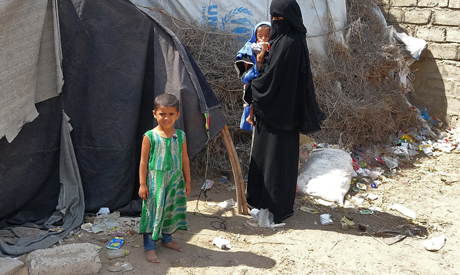
A Yemeni woman holds her son outside a shelter for the displaced in the war-ravaged western Hodeida province
Sweden and Switzerland will be hosting a virtual fundraising event for Yemen’s humanitarian crisis early next month, but it is not clear if the event is being coordinated with other parties. The new US Special Envoy to Yemen Tim Lenderking, reportedly spoke to the president of Yemen’s internationally recognised government Abd-Rabbu Mansour Hadi about a possible donors’ conference.
Whether such efforts will raise enough to finance aid missions in the humanitarian crisis is doubtful. The last UN donors’ meeting target was $2.4 billion, but it raised only $1.3 billion. Last month, UN Aid Chief Mark Lowcock said that most of the shortfall last year was because Gulf donors gave much less, adding that the target for 2021 is likely to be similar to the 3.4 billion in 2020. Underfunding led the UN and other aid agencies to scale down or close various assistance programmes in Yemen.
As calls for ending the war in Yemen intensify, UN agencies and other international humanitarian bodies warn that situation is at a tipping point. Some of the destruction in the country of more than 29 million may even be irreversible after over six years of war.
Out of the over 233 thousand killed, 133 thousand died indirectly – mainly due to malnutrition and lack of healthcare. The problems are exacerbated by pandemics, as cholera infected over 180 thousand last year before the onset of Covid-19. The war so far has left 4.4 million displaced and more than 13 million in poverty.
Last week, UN agencies warned that more than two million children under the age of five are expected to endure acute malnutrition in 2021. A report authored by four agencies, including UNICEF, warned that nearly one in six of those children – 400 thousands of the 2.3 million – are at risk of death due to severe acute malnutrition this year, a significant increase from last year’s estimates. There is also about 1.2 million pregnant or breastfeeding women in Yemen projected to be acutely malnourished this year.
Commenting on the report, World Food Program Executive Director David Beasley said: “The crisis in Yemen is a toxic mix of conflict, economic collapse and a severe shortage of funding to provide the life-saving help that’s desperately needed”.
UNICEF estimates that virtually all of Yemen’s 12 million children require some sort of assistance. This can include food aid, health services, schooling, clean water and cash grants to help the poorest families.
The World Health Organisation (WHO) Director-General Tedros Adhanom Ghebreyesus warned, “malnourished children are more vulnerable to diseases… It is a vicious and often deadly cycle, but with relatively cheap and simple interventions, many lives can be saved.”
These deaths and dire humanitarian conditions are not due to the Saudi-led coalition alone. Iran-backed Houthi rebels are also responsible, in addition to the inefficiency of the legitimate government and factional and tribal infighting. Allegations and counter allegations of hindering aid supplies have been exchanged between all parties involved in Yemen. In some cases, provision of aid – even by international agencies and UN organisations – was used as an inhumane tool in the conflict.
To facilitate humanitarian aid in areas under the control of Houthi militia, US Secretary of State Antony Blinken is removing Iran-backed rebels from the US list of foreign terrorist organisations as of Tuesday, 16 February. Blinken said in a statement that the decision to remove the group’s FTO designation as well as its Specially Designated Global Terrorist Designation was driven by “recognition of the dire humanitarian situation in Yemen”.
The move reverses an eleventh hour decision by the Trump administration that faced a backlash from bipartisan politicians and humanitarian organisations warning that the designation could imperil their ability to deliver crucial assistance to the people of Yemen, approximately 80 per cent of whom depend on it.
“We have listened to warnings from the United Nations, humanitarian groups and bipartisan members of Congress, among others, that the designations could have a devastating impact on Yemenis’ access to basic commodities like food and fuel”, Blinken said.
In an effort to end the war, which is the main reason behind the deteriorating humanitarian conditions, Lenderking visited Riyadh last week for meetings with Saudi and Yemeni officials as well as UN Special Envoy Martin Griffiths.
Despite all these reports, meetings and calls, ordinary Yemenis we spoke to expressed mixed feelings. Many are not optimistic that their sufferings will be alleviated soon even if the war ended. The country is already torn apart, and local political parties and militias are entrenched for long internal conflicts. Some referred to the fact that even international aid might still be used in the conflict citing how local organisations linked to the Muslim Brotherhood affiliate Islah Party are using humanitarian assistance to garner influence in some areas.
*A version of this article appears in print in the 18 February, 2021 edition of Al-Ahram Weekly
Short link: